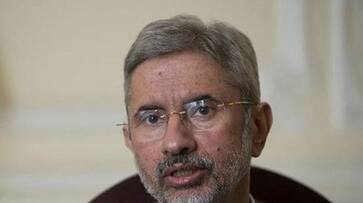Narendra Modi’s troubleshooter when it came to foreign policy, former foreign secretary Subrahmanyam Jaishankar has donned several significant caps. Jaishankar is best known for his stints as India’s ambassador to the US and China.
New Delhi: Narendra Modi’s troubleshooter when it came to foreign policy, former foreign secretary Subrahmanyam Jaishankar, became the most surprising pick for NDA’s second consecutive cabinet on Thursday. He is considered to have resolved the Doklam stand-off with China.
Having donned several significant caps, Jaishankar is best known for his stints as India’s ambassador to the US and China. His talent as a seasoned diplomat can be gauged from the fact that several seniors were sidelined to raise him as foreign secretary. He, however, immediately succeeded Sujata Singh after her rather unceremonious exit.
A graduate of St Stephen’s College of the Delhi University, an MA degree in political science and an MPhil and PhD in international relations from Jawaharlal Nehru University (JNU), Jaishankar came into contact with PM Modi when he was posted in China and the former, as Gujarat chief minister, had visited the country.
Incidentally, Modi was able to get Tebian Electric Apparatus to invest in a plant in Gujarat during that tour. For these reasons, the 1977-batch IFS officer, is considered close to the prime minister.
He also served as ambassador to the Czech Republic and high commissioner to Singapore. Jaishankar was instrumental in negotiating the Indo-US civilian nuclear agreement.
On retirement he joined Tata Sons as President, Global Corporate Affairs. This year Jaishankar was also conferred with Padma Shri, the fourth highest civilian award of India.
Jaishankar served as third secretary and second secretary in the Indian mission to the Soviet Union in Moscow from 1979 to 1981, where he studied Russian. He returned to New Delhi, where he worked as a special assistant to noted diplomat G Parthasarathi and as undersecretary in the America’s division of India's Ministry of External Affairs, dealing with the United States.
He was part of the team that resolved the dispute over the supply of US nuclear fuel to the Tarapur Power Stations in India. From 1985 to 1988 he was first secretary at the Indian embassy in Washington, DC.
From 1988 to 1990, he served in Sri Lanka as first secretary and political adviser to the Indian Peacekeeping Force (IPKF). From 1990 to 1993, he was counsellor (commercial) at the Indian mission in Budapest. Returning to New Delhi, he served as director (East Europe) in the Ministry of External Affairs and as press secretary and speechwriter for President of India Shankar Dayal Sharma.
Jaishankar was then deputy chief of mission at the Indian Embassy in Tokyo from 1996 to 2000. This period saw a downturn in Indo-Japan relations following India's Pokhran-II nuclear tests as well as a recovery after a visit to India by then Japanese Prime Minister Yoshiro Mori.
He is reported to have helped introduce future Japanese Prime Minister Shinzō Abe to his Indian counterpart, Manmohan Singh. In 2000, he was appointed India’s ambassador to the Czech Republic.
From 2004 to 2007, Jaishankar was joint secretary (Americas) at the Ministry of External Affairs in New Delhi. In this capacity, he was involved in negotiating the US-India civil nuclear agreement and improving defence co-operation, including during relief operations following the 2004 Indian Ocean tsunami. Jaishankar was also involved with the conclusion of the 2005 New Defense Framework and the Open Skies Agreement, and he was associated with the launch of the US-India Energy Dialogue the India-US Economic Dialogue, and the India-US CEO's Forum.
In 2006–2007, Jaishankar led the Indian team during the negotiations on the 123 Agreement with the United States. He also represented the Indian government at the Carnegie Endowment International Non-proliferation Conference in June 2007.
Last Updated May 30, 2019, 8:52 PM IST









![Salman Khan sets stage on fire for Anant Ambani, Radhika Merchant pre-wedding festivities [WATCH] ATG](https://static-gi.asianetnews.com/images/01hr1hh8y86gvb4kbqgnyhc0w0/whatsapp-image-2024-03-03-at-12-24-37-pm_100x60xt.jpg)
![Pregnant Deepika Padukone dances with Ranveer Singh at Anant Ambani, Radhika Merchant pre-wedding bash [WATCH] ATG](https://static-gi.asianetnews.com/images/01hr1ffyd3nzqzgm6ba0k87vr8/whatsapp-image-2024-03-03-at-11-45-35-am_100x60xt.jpg)


